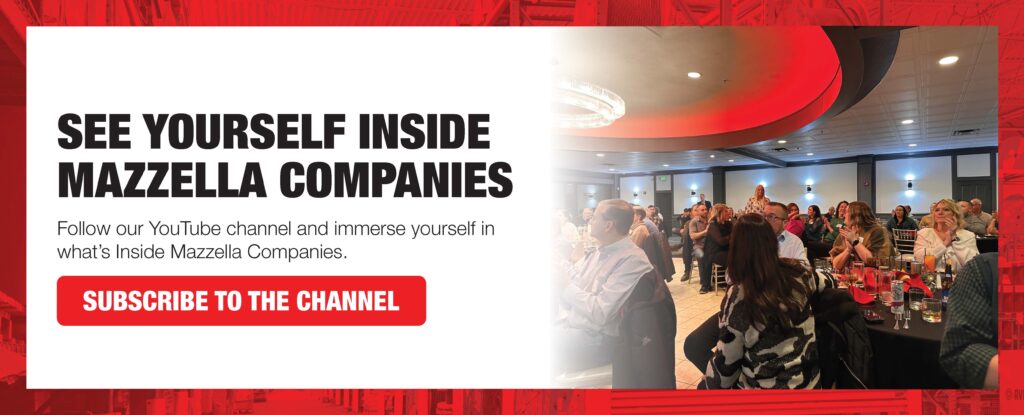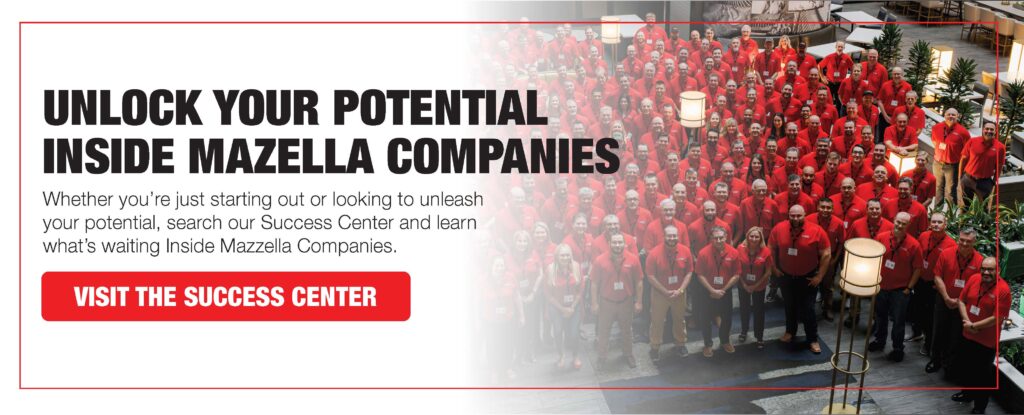If you’re applying to become a team member at Mazzella Companies, or you’re a hiring manager in your department, you must understand the differences between traditional and behavioral interview questions to feel confident and prepared for the interview ahead.
To learn more about the differences between the two styles you may experience, we sat down with our in-house interviewing experts, Emily Cavazos, Total Rewards Manager, Tony Dworznik, Talent Manager, and Candice Gouge, Director of Lifelong Learning.
In this article, we will answer the following:
- What are the differences between a traditional and behavioral interview?
- What kinds of questions will I be asked as an applicant?
- How can applicants prepare for both these types of interviews?
- How can hiring managers prepare for both of these types of interviews?
Related: What are the Steps in the Mazzella Companies’ Interview Process?
What does “traditional interview” mean?
A traditional interview is a formal process where a Talent Manager, Acquisition Partner, or Hiring manager meets with you to discuss the position and your suitability. During the meeting, you and the person interviewing you will ask about your background, experience, education, and skills. The main goal is to assess whether or not you meet the requirements for the role and how well you may fit into Mazzella Companies’ culture.
Brendan said he always starts with traditional questions to make the candidate comfortable. “I want them to feel like they can open up, so I always like to start more about them and their background before asking behavioral-based questions.”
Emily said, “Traditional is more around the person. Especially what interests them about the job and company, what they say will be a good indicator of their passion.”
What does “behavioral interview” mean?
Behavioral interview questions are all about assessing how you will handle future situations. This type of interview will focus heavily on how you dealt with a problem in the past during your work experience. The idea behind this type of interviewing is that our behavior will tend to predict future performance.
Candice said that behavioral questions are all about digging deeper. “You want to learn how candidates act, think, and respond to situations. The technique helps make the interview more conversational and allows you to ask follow-up questions instead of going off a set list.”
Tony said, “When we ask behavioral questions, it’s more open-ended. We want to give you that situation, maybe ask how you dealt with a previous co-worker who may not have been easy to work with. Because you’re going to run into situations that may not be favorable at any company you work for, and we want to know what steps you took to work things out, even if you ended up leaving at the end.”
What questions might be asked?
Traditional interview
- Tell me about yourself.
- What’s one of your strengths?
- What’s one of your weaknesses?
- Where do you see yourself in five years?
- Why are you interested in this position?
- What experience do you have in this field?
- What are your salary expectations?
Behavioral interview
- Tell me about a time when you had to work with a difficult coworker. How did you handle that situation?
- Describe a time when you had to make a difficult decision. What was the outcome?
- Tell me about a time when you had to work under pressure. How did you handle it?
- Describe a time when you had to deal with a demanding customer. How did you handle the situation?
- Tell me about a time when you had to work on a project with a tight deadline. How did you manage your time?

How can an applicant prepare for their interview?
Traditional interview
Tony said to come prepared to answer questions that display your interests, passion, and knowledge of the company. “Traditional questions will be about why you’re interested in the position and the company and give you a chance to share what type of work you like. It will also highlight if you’re a better fit for a different position within the organization. We want to know that they understand both the company and role.”
Brendan said to prepare to answer questions about your past work experience. “I want to hone in on that work experience. What industries they’ve worked in, how many people you supervised if you’re a manager, what kind of training you’ve gone through, what degrees or certifications you’ve obtained.”
Candice suggested reviewing your work history and list of projects you’ve worked on to be freshly prepared. “I’ve even opened up old files of projects I’ve created or worked on creating to remember what I’ve done. It’s good to remember what you’ve done in your past that will be relevant to the role you’re applying for.”
Applicants need to know that not all questions will be traditional or behavioral. There may be technical, depending on the role. Candice said, “If the role is for a welder, we may ask questions related to safety standards and equipment.”
Related to technical questions, Emily said that candidates with employment law familiarity are needed for HR specifically. “If we’re trying to test someone’s employment law, we may ask more pointed technical questions about FMLA and other benefits.”
Behavioral interview
Emily said that you can never know with certainty what you will be asked, but preparing is always the key. “I’ll usually practice with my husband at home for my interviews. Think of examples of things you’ve done in your past that you can highlight in your interview even if you’re not being asked behavioral questions. It’s one thing to be on the other side of the table asking the questions – it’s different whenever you’re interviewing for a job.”
Tony said that while traditional questions will be about your past, behavioral questions are about your future. “We want to know if you’ll be a good fit, of course, but we also want to know if you’ll be long-term. We’re always looking for long-term team members.”
Tony also advised you to research different behavioral interview questions based on the role. “Start thinking about how you would answer the questions truthfully. Think about those past working relationships, the projects you worked on.”

How can a hiring manager prepare for their interview?
Traditional interviews
Emily suggests using traditional interview questions to help fill in any gaps. “When reviewing their resume, jot down any questions based on their work history. Any gaps in work history or discrepancies between their LinkedIn, portfolio, and resume.”
Candice said traditional interview questions may hide red flags with an interviewee, so it’s essential not to use them to assess behavior. “You may be giving the candidate an option to give you an answer based on what they think you want to hear. It might be easy for the candidate to game the system if you’re too scripted. Asking when you did your job right versus asking what your job is.”
Tony suggested staying focused and on track throughout the interview. “Sometimes traditional questions can take you on a different path and where you want to be. Stay focused on work history, skills, and experience.”
Behavioral interviews
Candice said that preparing for a behavioral interview is essential as a hiring manager. “It’s important that you understand what you’re looking for. If you’re looking for a responsive candidate, you will want to ask them questions that will help them demonstrate how they respond.”
Candice also shared that whoever is asking the questions must prepare to ask follow-up questions. “I don’t come up with a list of ten questions I’ll ask. I’ll typically come up with maybe three questions for each behavior I want from the candidate. Each question should then lead to a follow-up question. It should give the big picture of how they like to work.”
In line with Candice’s advice, Brendan said consistency is the key to productive behavioral interviews with multiple candidates. “The best way to perform this type of interview is to ask the same questions with each candidate. The consistency will give you a better idea of who is suited best.”
Tony said that if there are any questions, use the resources available. “At Mazzella Companies, we use the Working Genius assessment, and there are a lot of tools with that assessment that can help keep things uniform and relevant. You can also always reach out to your HR or talent partners. We’re always here to help go through scenarios with you.”
Conclusion
Whether you’re applying to become a team member or responsible for making hiring decisions at Mazzella Companies, it’s crucial to understand the differences between traditional and behavioral interview questions. Knowing the differences can help you feel more confident and prepared for your upcoming interview. Know your strengths and weaknesses, refresh yourself on your work experience, and come prepared to share stories about times you overcame the challenges we all experience in our career journey.

